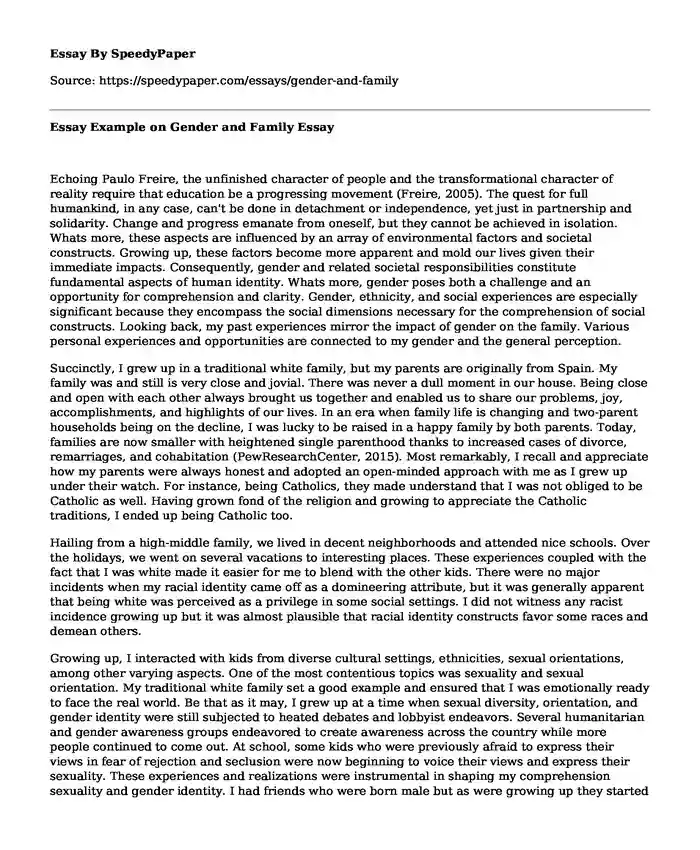Echoing Paulo Freire, the unfinished character of people and the transformational character of reality require that education be a progressing movement (Freire, 2005). The quest for full humankind, in any case, can't be done in detachment or independence, yet just in partnership and solidarity. Change and progress emanate from oneself, but they cannot be achieved in isolation. Whats more, these aspects are influenced by an array of environmental factors and societal constructs. Growing up, these factors become more apparent and mold our lives given their immediate impacts. Consequently, gender and related societal responsibilities constitute fundamental aspects of human identity. Whats more, gender poses both a challenge and an opportunity for comprehension and clarity. Gender, ethnicity, and social experiences are especially significant because they encompass the social dimensions necessary for the comprehension of social constructs. Looking back, my past experiences mirror the impact of gender on the family. Various personal experiences and opportunities are connected to my gender and the general perception.
Succinctly, I grew up in a traditional white family, but my parents are originally from Spain. My family was and still is very close and jovial. There was never a dull moment in our house. Being close and open with each other always brought us together and enabled us to share our problems, joy, accomplishments, and highlights of our lives. In an era when family life is changing and two-parent households being on the decline, I was lucky to be raised in a happy family by both parents. Today, families are now smaller with heightened single parenthood thanks to increased cases of divorce, remarriages, and cohabitation (PewResearchCenter, 2015). Most remarkably, I recall and appreciate how my parents were always honest and adopted an open-minded approach with me as I grew up under their watch. For instance, being Catholics, they made understand that I was not obliged to be Catholic as well. Having grown fond of the religion and growing to appreciate the Catholic traditions, I ended up being Catholic too.
Hailing from a high-middle family, we lived in decent neighborhoods and attended nice schools. Over the holidays, we went on several vacations to interesting places. These experiences coupled with the fact that I was white made it easier for me to blend with the other kids. There were no major incidents when my racial identity came off as a domineering attribute, but it was generally apparent that being white was perceived as a privilege in some social settings. I did not witness any racist incidence growing up but it was almost plausible that racial identity constructs favor some races and demean others.
Growing up, I interacted with kids from diverse cultural settings, ethnicities, sexual orientations, among other varying aspects. One of the most contentious topics was sexuality and sexual orientation. My traditional white family set a good example and ensured that I was emotionally ready to face the real world. Be that as it may, I grew up at a time when sexual diversity, orientation, and gender identity were still subjected to heated debates and lobbyist endeavors. Several humanitarian and gender awareness groups endeavored to create awareness across the country while more people continued to come out. At school, some kids who were previously afraid to express their views in fear of rejection and seclusion were now beginning to voice their views and express their sexuality. These experiences and realizations were instrumental in shaping my comprehension sexuality and gender identity. I had friends who were born male but as were growing up they started to exhibit less masculine characteristics. Their sex was male but they identified themselves more with feminine traits. According to Diamond (2012), is the extent to which a person attributes themselves as being either masculine or feminine while sex encompasses various reproductive characteristics that mark the difference between males and females.
In conclusion, gender identity and attitudes depicted by social constructs have extensive impacts on family. There is a generally acknowledged and bolstered conviction that the family, constituted of legitimately wedded parents raising their own particular natural posterity in a select course of action is the solitary ethically and socially alluring selection of grown-ups and kids alike. Despite the fact that the idea of family is currently generally challenged, there are a variety of hypothetical arguments with reference to why this conviction is maintained. My story depicts the implications of family patterns of gender on the quality of family cohesion and relationships. Be that as it may, the backdrop above is neither sufficient to make plausible conclusions and precise predictions about underlying latent, nor the relationship between the identity and other social constructs. The backdrop is an isolated depiction of how gender impacted my family. These impacts of my gender are evident through parenting approaches that my parents adopted and their approach. Growing up as a white straight male in a high-middle class equipped me with a perfect blend of tools that were imperative to my compression of the concept of gender and family. In synopsis, all my experiences, opportunities, and my family background enriched my comprehension of gender, family, and social constructs.
References
Diamond, M. (2002). Sex and Gender Are Different: Sexual Identity and Gender Identity Are Different. Clinical Child Psychology & Psychiatry, 320334.
Freire, P. (2005). Pedagogy of the Oppressed. New York: The Continuum International Publishing Group Inc.
PewResearchCenter. (2015, December 17). Parenting in America. Retrieved from PewResearchCenter: http://www.pewsocialtrends.org/2015/12/17/parenting-in-america/
Cite this page
Essay Example on Gender and Family. (2019, Dec 10). Retrieved from https://speedypaper.net/essays/gender-and-family
Request Removal
If you are the original author of this essay and no longer wish to have it published on the SpeedyPaper website, please click below to request its removal:
- Reflective Essay Sample: Team Management
- US Airline Industry Analysis in Our Free Essay
- Law Essay Example: Punishment and Sentencing
- Essay Sample on the Roles of a School Principal
- Vogue Fashion-Shows
- Essay Sample on Strategy: Coca Cola Company
- Free paper Sample: Terrorism in Developing and Developed Countries
Popular categories





